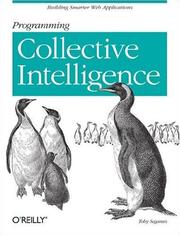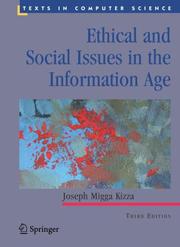| Listing 1 - 7 of 7 |
Sort by
|

ISBN: 9780596529321 0596529325 Year: 2007 Publisher: Beijing: O'Reilly,
Abstract | Keywords | Export | Availability | Bookmark
 Loading...
Loading...Choose an application
- Reference Manager
- EndNote
- RefWorks (Direct export to RefWorks)
Book
ISBN: 9782729831462 2729831460 Year: 2007 Publisher: Paris : Ellipses,
Abstract | Keywords | Export | Availability | Bookmark
 Loading...
Loading...Choose an application
- Reference Manager
- EndNote
- RefWorks (Direct export to RefWorks)
Le développement extraordinaire des technologies d'information et de communication laisse entrevoir des progrès considérables dans les domaines de l'économie, des loisirs et plus généralement de la connaissance. Ces progrès seront-ils partagés par tous ? L'expression " fracture numérique ", apparue il y a une dizaine d'années aux Etats-Unis, interroge un monde idyllique ou chacun, partout, bénéficierait des apports des nouvelles technologies digitales. Des lignes de clivage numérique apparaissent pourtant entre groupes sociaux, générations, régions et parties du monde. Qui plus est, certaines fissures tendent inexorablement à s'élargir, justifiant le terme de fracture. Peut-on espérer réduire la fracture numérique et comment y parvenir ? La première partie du livre répond à ces questions. Dans la deuxième partie, l'auteur ouvre la réflexion autour de questions essentielles : La fracture numérique peut-elle être réduite par le téléphone mobile ? La principale fracture numérique est-elle Nord/Sud ?...
Information technology --- Technological innovations --- Social aspects --- Technologie de l'information --- Aspect social. --- Information technology - Social aspects --- Technological innovations - Social aspects --- Internet --- Nouvelles technologies de l'information et de la communication --- Inégalité sociale --- Aspect social

ISBN: 0262033550 9780262033558 9786612096174 1282096176 026225588X 1429418672 9780262255882 9780262513180 9781429418676 0262513188 9781282096172 6612096179 0262262304 Year: 2007 Publisher: Cambridge MIT press
Abstract | Keywords | Export | Availability | Bookmark
 Loading...
Loading...Choose an application
- Reference Manager
- EndNote
- RefWorks (Direct export to RefWorks)
"Wireless networks are the fastest growing communications technology in history. Are mobile phones expressions of identity, fashionable gadgets, tools for life - or all of the above? Mobile Communication and Society looks at how the possibility of multimodal communication from anywhere to anywhere at any time affects everyday life at home, at work, and at school, and raises broader concerns about politics and culture both global and local." "Drawing on data gathered from around the world, the authors explore who has access to wireless technology, and why, and analyze the patterns of social differentiation seen in unequal access. They explore the social effects of wireless communication - what it means for family life, for example, when everyone is constantly in touch, or for the idea of an office when workers can work anywhere. Is the technological ability to multitask further compressing time in our already hurried existence?" "The authors consider the rise of a mobile youth culture based on peer-to-peer networks, with its own language of texting, and its own values. They examine the phenomenon of flash mobs, and the possible political implications. And they look at the relationship between communication and development and the possibility that developing countries could "leapfrog" directly to wireless and satellite technology. This sweeping book - moving easily in its analysis from the United States to China, from Europe to Latin America and Africa - answers the key questions about our transformation into a mobile network society."--Jacket.
Mass communications --- Communication --- Mobile communication systems --- Information technology --- Radiocommunications mobiles --- Technologie de l'information --- Social aspects. --- Aspect social --- Social aspects --- #SBIB:309H103 --- #SBIB:309H1711 --- 316.323.9 --- Mediatechnologie / ICT / digitale media: sociale en culturele aspecten --- Nieuwe media, informatietechnologie (videotex, beeldplaat, interactieve televisie, vergadertelevisie,...) --- Postmoderne maatschappij. Sociologie van het postmodernisme --- 316.323.9 Postmoderne maatschappij. Sociologie van het postmodernisme --- Vehicles --- Vehicular communication systems --- Communication systems --- Radio --- Wireless communication systems --- Communication and culture --- INFORMATION SCIENCE/Communications & Telecommunications --- INFORMATION SCIENCE/Technology & Policy --- Communication - Social aspects --- Mobile communication systems - Social aspects --- Information technology - Social aspects --- Acqui 2006


ISBN: 9780387723808 0387723803 0387723811 Year: 2007 Volume: 233 Publisher: New York Springer
Abstract | Keywords | Export | Availability | Bookmark
 Loading...
Loading...Choose an application
- Reference Manager
- EndNote
- RefWorks (Direct export to RefWorks)
International Federation for Information Processing The IFIP series publishes state-of-the-art results in the sciences and technologies of information and communication. The scope of the series includes: foundations of computer science; software theory and practice; education; computer applications in technology; communication systems; systems modeling and optimization; information systems; computers and society; computer systems technology; security and protection in information processing systems; artificial intelligence; and human-computer interaction. Proceedings and post-proceedings of referred international conferences in computer science and interdisciplinary fields are featured. These results often precede journal publication and represent the most current research. The principal aim of the IFIP series is to encourage education and the dissemination and exchange of information about all aspects of computing. For more information about the 300 other books in the IFIP series, please visit www.springer.com. For more information about IFIP, please visit www.ifip.org.
Information society --- Information technology --- Société informatisée --- Technologie de l'information --- Congresses --- Congrès --- Berleur, Jacques --- Information society. --- Information technology -- Social aspects. --- Information technology. --- Computer Science --- Social Change --- Engineering & Applied Sciences --- Sociology & Social History --- Social Sciences --- #SBIB:35H24 --- #SBIB:35H52 --- #SBIB:324H20 --- Informatiemanagement bij de overheid --- Ethiek van bestuur en beleid --- Politologie: theorieën (democratie, comparatieve studieën….) --- Conferences - Meetings --- Société informatisée --- Congrès --- EPUB-LIV-FT SPRINGER-B --- Computer science. --- Computers and civilization. --- Computer Science. --- Computers and Society. --- Informatics --- Science --- Civilization and computers --- Civilization --- Technologies de l'information

ISBN: 0415367433 0415367441 9780415367431 9780415367448 9780203827062 9781136798665 9781136798702 9781136798719 Year: 2007 Publisher: London Routledge
Abstract | Keywords | Export | Availability | Bookmark
 Loading...
Loading...Choose an application
- Reference Manager
- EndNote
- RefWorks (Direct export to RefWorks)
Cell phones and mobile technologies are omnipresent in everyday life, yet the cultural implications of mobile phones have been neglected. This book aims to fill this gap, providing the first comprehensive, accessible, and international introduction to cell phone culture and theory. It offers a clear yet sophisticated overview of mobile telecommunications, putting the technology in historical and technical context. ' Cell Phone Culture 'is a fascinating biography of an important cultural object, that adopts an integrated, multiperspectival approach to the cultural and social shaping of technology. Goggin considers the mobile phone from the standpoint of its history, production, design, consumption, and representation, as well as its deep implication in contemporary media convergence - such as digital photography, mobile blogging, mobile Internet, and mobile television. Interdisciplinary in its conceptual framework, 'Cell Phone Culture 'draws on a wide range of national, regional, and internationalexamples, to carefully explore the new forms of consumption and use of communication and media technology that the phenomenon of mobiles represents. 'Cell Phone Culture' also reflects upon the challenges and provocations of mobile phone technology, use, and consumption for doing cultural and media studies today.
Cell phone systems. --- Cellular telephone systems. --- Information society. --- Information technology --- Mobile communication systems. --- Social aspects. --- #SBIB:309H1711 --- Nieuwe media, informatietechnologie (videotex, beeldplaat, interactieve televisie, vergadertelevisie,...) --- Mass communications --- Sociology of culture --- Cell phone systems --- Information society --- Mobile communication systems --- #SBIB:309H103 --- Vehicles --- Vehicular communication systems --- Radio --- Wireless communication systems --- Sociology --- Information superhighway --- Cellular radio --- Cellular radiotelephone systems --- Cellular systems (Telecommunication) --- Cellular telephone systems --- Mobile telephony --- Wireless telephone systems (Cell phone) --- Telephone systems --- Social aspects --- Mediatechnologie / ICT / digitale media: sociale en culturele aspecten --- Communication systems --- Information technology - Social aspects

ISBN: 184628659X 1846286581 9781846286582 Year: 2007 Publisher: London : Springer London : Imprint: Springer,
Abstract | Keywords | Export | Availability | Bookmark
 Loading...
Loading...Choose an application
- Reference Manager
- EndNote
- RefWorks (Direct export to RefWorks)
Ethical dilemmas have risen in number and intensity with the increasing dependence of contemporary society on computers and computer networks. Despite the proliferation of expert remedies, viable solutions to computer security issues remain too elusive, and society continues to suffer at the hands of cyber criminals, vandals, and hackers. This comprehensive third edition of the successful Ethical and Social Issues in the Information Age takes off where the second ended to examine ethical, social, and policy challenges stemming from the emergence of cyberspace, the convergence of telecommunication and computing technologies, and the miniaturalization of computing, telecommunication, and information-enabling devices. This accessible volume broadly surveys thought-provoking questions about the impact of these new technologies, with particular emphasis on the rapid growth of a multitude of computer networks, including the Internet. It assumes only a very modest familiarity with the basic computer literacy. Topics and features: • Describes how changes in information technology influence morality and the law • Provides fundamental discussion of network-security system design and operation to reveal vulnerable areas in computer network infrastructure (NEW chapter) • Surveys the history of computing and the evolution of computer crimes • Explores biometric techniques to system access control (NEW chapter) • Incorporates recent requirements for computer curricula • Introduces and explores techniques in electronic crime investigation (NEW chapter) • Assesses workplace concerns related to privacy, surveillance, and virtual offices • Offers a pertinent discussion on civil liberties, harassment, and discrimination • Contains chapter-ending exercises, and the author provides instructor classroom support materials and teaching guides at his website This newly revised text/reference provides an updated discussion of the ethical and social issues that continue to evolve as computing and information technologies proliferate. Students at all levels who need to learn about computer ethics, the legal aspects of computing, network security, computer crime investigation, and biometrics will find this well documented work an invaluable resource. The book is also highly useful for practitioners needing such insights for their work. Supplementary material can be found at: www.utc.edu/faculty/Joseph-Kizza.
Information technology --- Computers --- Computers and civilization. --- Moral and ethical aspects. --- Social aspects. --- Civilization and computers --- Civilization --- Information ethics --- Computer science. --- Ethics. --- Data encryption (Computer science). --- Social sciences. --- Computers and Society. --- Information Systems Applications (incl. Internet). --- Cryptology. --- User Interfaces and Human Computer Interaction. --- Social Sciences, general. --- Behavioral sciences --- Human sciences --- Sciences, Social --- Social science --- Social studies --- Data encoding (Computer science) --- Encryption of data (Computer science) --- Computer security --- Cryptography --- Deontology --- Ethics, Primitive --- Ethology --- Moral philosophy --- Morality --- Morals --- Philosophy, Moral --- Science, Moral --- Philosophy --- Values --- Informatics --- Science --- Application software. --- User interfaces (Computer systems). --- Interfaces, User (Computer systems) --- Human-machine systems --- Human-computer interaction --- Application computer programs --- Application computer software --- Applications software --- Apps (Computer software) --- Computer software --- Information technology - Moral and ethical aspects. --- Information technology - Social aspects. --- Computers - Moral and ethical aspects.
Book
ISBN: 9783540739999 3540739998 3540740007 Year: 2007 Publisher: Berlin ; Heidelberg : Springer-Verlag,
Abstract | Keywords | Export | Availability | Bookmark
 Loading...
Loading...Choose an application
- Reference Manager
- EndNote
- RefWorks (Direct export to RefWorks)
Intercultural communication --- Information technology --- Natural language processing (Computer science) --- Communication interculturelle --- Technologie de l'information --- Traitement automatique des langues naturelles --- Congresses. --- Social aspects --- Congrès --- Aspect social --- Information technology -- Social aspects -- Congresses. --- Intercultural communication -- Congresses. --- Natural language processing (Computer science) -- Congresses. --- Computer Science --- Social Change --- Sociology & Social History --- Engineering & Applied Sciences --- Social Sciences --- Computer science. --- Information storage and retrieval. --- Multimedia information systems. --- User interfaces (Computer systems). --- Computational linguistics. --- Application software. --- Computers and civilization. --- Computer Science. --- User Interfaces and Human Computer Interaction. --- Information Storage and Retrieval. --- Multimedia Information Systems. --- Language Translation and Linguistics. --- Computer Appl. in Social and Behavioral Sciences. --- Computers and Society. --- Civilization and computers --- Civilization --- Application computer programs --- Application computer software --- Applications software --- Apps (Computer software) --- Computer software --- Automatic language processing --- Language and languages --- Language data processing --- Linguistics --- Natural language processing (Linguistics) --- Applied linguistics --- Cross-language information retrieval --- Mathematical linguistics --- Multilingual computing --- Interfaces, User (Computer systems) --- Human-machine systems --- Human-computer interaction --- Computer-based multimedia information systems --- Multimedia computing --- Multimedia information systems --- Multimedia knowledge systems --- Information storage and retrieval systems --- Informatics --- Science --- Data processing --- Information storage and retrieva. --- Multimedia systems. --- Natural language processing (Computer science). --- Social sciences --- Natural Language Processing (NLP). --- Data processing. --- NLP (Computer science) --- Artificial intelligence --- Electronic data processing --- Semantic computing --- Information storage and retrieval systems. --- Automatic data storage --- Automatic information retrieval --- Automation in documentation --- Computer-based information systems --- Data processing systems --- Data storage and retrieval systems --- Discovery systems, Information --- Information discovery systems --- Information processing systems --- Information retrieval systems --- Machine data storage and retrieval --- Mechanized information storage and retrieval systems --- Computer systems --- Electronic information resources --- Data libraries --- Digital libraries --- Information organization --- Information retrieval
| Listing 1 - 7 of 7 |
Sort by
|

 Search
Search Feedback
Feedback About UniCat
About UniCat  Help
Help News
News